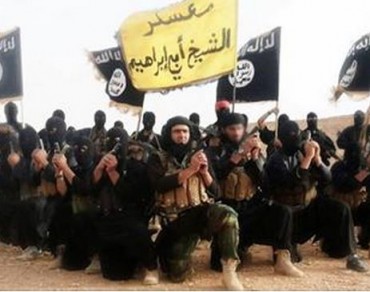
Two University of California-Santa Barbara history professors, Sherene Seikaly and Adam Sabra, held a discussion titled “ISIS: A Historical Perspective” back on May 20.
Assistant Professor Sherene Seikaly’s portion of the talk “focused on the formation of ISIS as influenced by a combination of Arab authoritarianism and United States intervention.”
However, the former’s allotment basically was composed of pointing out that Saddam Hussein was a bad guy. Regarding the latter … well, that appears to have taken up the bulk of the chat.
Seikaly began her portion of the talk by pointing to the U.S. use of depleted uranium in the battle of Fallujah, which she noted caused high [sic] rates of cancers, like leukemia, and birth defects than were found in a post-nuclear Nagasaki.
“Fallujah was effectively emptied of its population and destroyed,” said Sabra, also noting that the U.S. began recruiting many Sunnis successfully during their occupation of the city.
Seikaly also noted the high rates of mass incarceration, torture, and long-term detention of Iraqis by U.S. forces. Those that would become leaders of ISIS and similar groups, Seikaly stated, were able to build alliances in these prisons.
“This group [ISIS] does not emerge out of a sudden Islamic tendency for beheading,” Seikaly said, before elaborating on the role of authoritarian regimes in the region. Seikaly noted a deep kind of sectarianism in the region—some of which was organic, some of which was incited by the U.S. as well as Iranian and Saudi Arabian governments. “These different interests benefit from a lack of unity,” she said, pointing to the ways in which tensions between Sunni and Shiite groups have been aggravated.
“Sectarianism didn’t just happen,” said Sabra. “People didn’t automatically go for a gun and start shooting people of a different ethnicity or religion.”
Seikaly gave a brief overview of the 1991 war in Iraq, a US reaction to invasion of Kuwait by the regime of Saddam Hussein. After the war, the US imposed heavy sanctions on Iraq.
“The outcome of this war was devastating on the Iraqi people,” said Seikaly. “They were subject to one of the harshest sanction regimes in recent history. Those who paid the price for these sanctions weren’t those in the regime, but the people of Iraq.
Seikaly’s statement about depleted uranium (DU) is highly debatable. While indeed there have been pockets of cancers and birth defects in and around Fallujah and other areas in Iraq, stating that DU is the cause is factually suspect (“it is difficult to pin down the exact cause of the cancers and birth defects”), especially given some of the literature on the effects of the ammunition.
Regarding Sabra’s comment about sectarianism not being a spontaneous event, UC-Irvine’s Gary Fouse notes “Actually, Sunnis and Shia have been killing each other ever since their little disagreement over who should have succeeded Mohammad back in the 7th century.”
Like The College Fix on Facebook / Follow us on Twitter





Please join the conversation about our stories on Facebook, Twitter, Instagram, Reddit, MeWe, Rumble, Gab, Minds and Gettr.